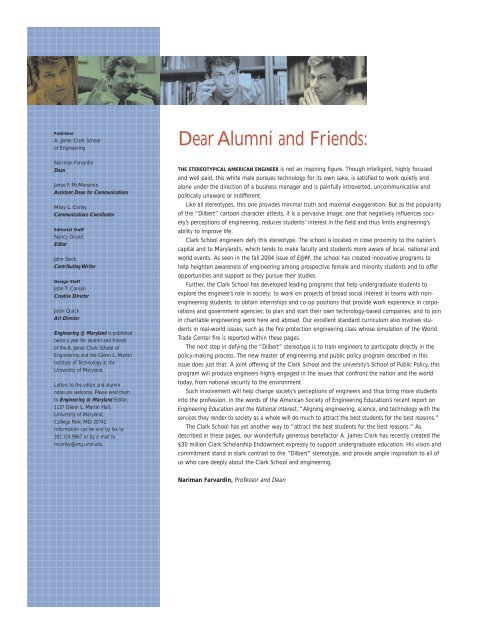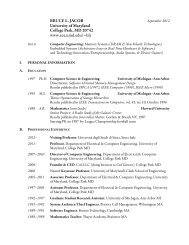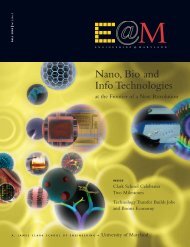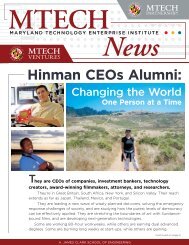Spring 2005 - A. James Clark School of Engineering - University of ...
Spring 2005 - A. James Clark School of Engineering - University of ...
Spring 2005 - A. James Clark School of Engineering - University of ...
You also want an ePaper? Increase the reach of your titles
YUMPU automatically turns print PDFs into web optimized ePapers that Google loves.
Publisher<br />
A. <strong>James</strong> <strong>Clark</strong> <strong>School</strong><br />
<strong>of</strong> <strong>Engineering</strong><br />
Nariman Farvardin<br />
Dean<br />
<strong>James</strong> F. McMenamin<br />
Assistant Dean for Communications<br />
Missy L. Corley<br />
Communications Coordinator<br />
Editorial Staff<br />
Nancy Grund<br />
Editor<br />
John Stack<br />
Contributing Writer<br />
Design Staff<br />
John T. Consoli<br />
Creative Director<br />
Jason Quick<br />
Art Director<br />
<strong>Engineering</strong> @ Maryland is published<br />
twice a year for alumni and friends<br />
<strong>of</strong> the A. <strong>James</strong> <strong>Clark</strong> <strong>School</strong> <strong>of</strong><br />
<strong>Engineering</strong> and the Glenn L. Martin<br />
Institute <strong>of</strong> Technology at the<br />
<strong>University</strong> <strong>of</strong> Maryland.<br />
Letters to the editor and alumni<br />
notes are welcome. Please send them<br />
to <strong>Engineering</strong> @ Maryland Editor,<br />
1137 Glenn L. Martin Hall,<br />
<strong>University</strong> <strong>of</strong> Maryland,<br />
College Park, MD 20742.<br />
Information can be sent by fax to<br />
301.314.9867 or by e-mail to<br />
mcorley@eng.umd.edu<br />
Dear Alumni and Friends:<br />
THE STEREOTYPICAL AMERICAN ENGINEER is not an inspiring figure. Though intelligent, highly focused<br />
and well paid, this white male pursues technology for its own sake, is satisfied to work quietly and<br />
alone under the direction <strong>of</strong> a business manager and is painfully introverted, uncommunicative and<br />
politically unaware or indifferent.<br />
Like all stereotypes, this one provides minimal truth and maximal exaggeration. But as the popularity<br />
<strong>of</strong> the “Dilbert” cartoon character attests, it is a pervasive image, one that negatively influences society’s<br />
perceptions <strong>of</strong> engineering, reduces students’ interest in the field and thus limits engineering’s<br />
ability to improve life.<br />
<strong>Clark</strong> <strong>School</strong> engineers defy this stereotype. The school is located in close proximity to the nation’s<br />
capital and to Maryland’s, which tends to make faculty and students more aware <strong>of</strong> local, national and<br />
world events. As seen in the fall 2004 issue <strong>of</strong> E@M, the school has created innovative programs to<br />
help heighten awareness <strong>of</strong> engineering among prospective female and minority students and to <strong>of</strong>fer<br />
opportunities and support as they pursue their studies.<br />
Further, the <strong>Clark</strong> <strong>School</strong> has developed leading programs that help undergraduate students to<br />
explore the engineer’s role in society; to work on projects <strong>of</strong> broad social interest in teams with nonengineering<br />
students; to obtain internships and co-op positions that provide work experience in corporations<br />
and government agencies; to plan and start their own technology-based companies; and to join<br />
in charitable engineering work here and abroad. Our excellent standard curriculum also involves students<br />
in real-world issues, such as the fire protection engineering class whose simulation <strong>of</strong> the World<br />
Trade Center fire is reported within these pages.<br />
The next step in defying the “Dilbert” stereotype is to train engineers to participate directly in the<br />
policy-making process. The new master <strong>of</strong> engineering and public policy program described in this<br />
issue does just that. A joint <strong>of</strong>fering <strong>of</strong> the <strong>Clark</strong> <strong>School</strong> and the university’s <strong>School</strong> <strong>of</strong> Public Policy, this<br />
program will produce engineers highly engaged in the issues that confront the nation and the world<br />
today, from national security to the environment.<br />
Such involvement will help change society’s perceptions <strong>of</strong> engineers and thus bring more students<br />
into the pr<strong>of</strong>ession. In the words <strong>of</strong> the American Society <strong>of</strong> <strong>Engineering</strong> Education’s recent report on<br />
<strong>Engineering</strong> Education and the National Interest, “Aligning engineering, science, and technology with the<br />
services they render to society as a whole will do much to attract the best students for the best reasons.”<br />
The <strong>Clark</strong> <strong>School</strong> has yet another way to “attract the best students for the best reasons.” As<br />
described in these pages, our wonderfully generous benefactor A. <strong>James</strong> <strong>Clark</strong> has recently created the<br />
$30 million <strong>Clark</strong> Scholarship Endowment expressly to support undergraduate education. His vision and<br />
commitment stand in stark contrast to the “Dilbert” stereotype, and provide ample inspiration to all <strong>of</strong><br />
us who care deeply about the <strong>Clark</strong> <strong>School</strong> and engineering.<br />
Nariman Farvardin, Pr<strong>of</strong>essor and Dean





